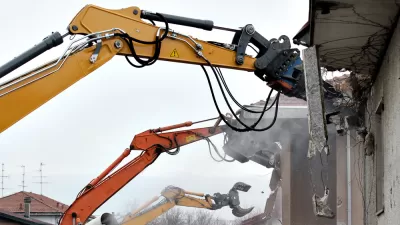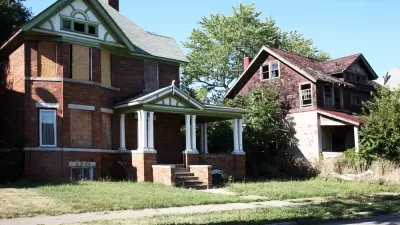A response to the conventional thinking about demolitions as the antidote to blighted, vacant properties and the negative effects that follow.
Columnist Dan Rodricks has a prescription for the city of Baltimore that departs from conventional thinking about demolishing vacant and blighted properties.
First Rodricks summarizes the arguments that support demolition campaigns:
- "People who call for bulldozing whole blocks seem to think that a developer will suddenly find the flattened area wildly attractive and build new, well-appointed "townhomes" for Baltimore's growing professional class."
- "Some people believe the demolition of old, decrepit Baltimore will create grand opportunities for more green space — vast city parks and sprawling urban gardens."
- "Some believe that, at the very least, more demolition will give areas of the city a psychological lift and a break from crime."
Maryland Governor Larry Hogan himself supports these arguments, as he states in a September 18 op-ed for The Baltimore Sun. In that op-ed, Governor Hogan promises to "advance a plan to knock down blocks of derelict buildings that tarnish communities across Baltimore, replacing them with parks and other open spaces."
Rodricks, however, thinks the governor would better support the city by sending money, rather than bulldozers. In his estimation, revitalization will require a complex policy agenda:
"Resolving Baltimore's vacant house problem involves vigorous housing code enforcement; going to court to seize properties; respecting the rights of homeowners who live in or near blighted properties and, if necessary, relocating them (at significant expense to taxpayers); getting developers to invest; giving financial incentives to homebuyers willing to rehabilitate houses; dealing with neighbors and raw emotions that can sink even small projects with great merit."
FULL STORY: How Hogan can best help city deal with vacants

Alabama: Trump Terminates Settlements for Black Communities Harmed By Raw Sewage
Trump deemed the landmark civil rights agreement “illegal DEI and environmental justice policy.”

Study: Maui’s Plan to Convert Vacation Rentals to Long-Term Housing Could Cause Nearly $1 Billion Economic Loss
The plan would reduce visitor accommodation by 25% resulting in 1,900 jobs lost.

Planetizen Federal Action Tracker
A weekly monitor of how Trump’s orders and actions are impacting planners and planning in America.

Waymo Gets Permission to Map SF’s Market Street
If allowed to operate on the traffic-restricted street, Waymo’s autonomous taxis would have a leg up over ride-hailing competitors — and counter the city’s efforts to grow bike and pedestrian on the thoroughfare.

Parklet Symposium Highlights the Success of Shared Spaces
Parklets got a boost during the Covid-19 pandemic, when the concept was translated to outdoor dining programs that offered restaurants a lifeline during the shutdown.

Federal Homelessness Agency Places Entire Staff on Leave
The U.S. Interagency Council on Homelessness is the only federal agency dedicated to preventing and ending homelessness.
Urban Design for Planners 1: Software Tools
This six-course series explores essential urban design concepts using open source software and equips planners with the tools they need to participate fully in the urban design process.
Planning for Universal Design
Learn the tools for implementing Universal Design in planning regulations.
Caltrans
Smith Gee Studio
Institute for Housing and Urban Development Studies (IHS)
City of Grandview
Harvard GSD Executive Education
Toledo-Lucas County Plan Commissions
Salt Lake City
NYU Wagner Graduate School of Public Service





























